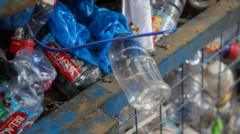Can Countries Unite to Solve the Plastic Crisis?

Understanding the Plastic Crisis: A Dual-Edged Sword
In the last century, plastic production has surged, simultaneously heralded as a miraculous innovation and branded a pollution catastrophe. With nearly 200 trillion pieces of plastic currently floating in the world's oceans, experts warn that this figure could triple if no action is taken. In 2022, nations agreed on the necessity of developing a legally binding global treaty to mitigate plastic waste and harmful chemicals found in some plastics. However, two years later, no agreement has been established. As representatives from around the world prepare to meet again at a UN conference in Geneva, the question remains: can they finally reach a consensus to curb the excessive production and waste of plastics?
The Historical Context of Plastic Use
For centuries, human societies have utilized naturally occurring plastics, such as rubber and shellac. However, the 20th century marked the dawn of synthetic plastics, primarily derived from fossil fuels. This marked a significant turning point in material science. The versatility, durability, and heat-resistant properties of synthetic plastics have led to their adoption in countless applications, ranging from sewage pipes to life-saving medical equipment and even clothing. Thus, plastic's rapid integration into daily life has raised concerns about its environmental impact, as we are only beginning to understand the full scope of its consequences.
The Exponential Growth of Plastic Production
Plastic production has skyrocketed in recent decades. In 1950, only 2 million tonnes were produced; by 2022, this number surged to an astonishing 475 million tonnes. While plastic can technically be reused, the reality is that the cost and availability of recycling infrastructure mean that a mere fraction is actually recycled. Studies reveal that approximately 60% of all plastics are single-use, with an estimated 10% being recycled. This stark reality underscores the need for a reevaluation of how we produce and manage plastic waste.
The Impact of Plastic on Marine Wildlife
Plastics pose significant threats to marine ecosystems. Many marine animals mistake plastic for food, leading to severe health issues, including internal organ damage and even fatalities due to digestive complications. Additionally, animals can become entangled in discarded fishing gear or plastic packaging, compounding the problem. Once plastics enter the environment, they typically break down into smaller pieces known as microplastics, which have been found in locations as diverse as the deep sea and mountaintops. Ongoing research is critical to fully understand the impact of microplastics on various species; however, early evidence suggests that there is a troubling threshold beyond which animals begin to suffer harm.
The Health Risks Associated with Plastics
According to a recent expert report from The Lancet Countdown, the health-related impacts of the plastic crisis are alarming. It is estimated that this crisis is responsible for at least $1.5 trillion (£1.1 trillion) annually in health-related damages. These issues range from air pollution generated during plastic production to increased risks of cancer, respiratory illnesses, and even miscarriages linked to plastic contamination in the human body. Plastics contain over 16,000 chemicals, including dyes and flame retardants, many of which are toxic and linked to cancer. Despite the growing body of evidence highlighting these dangers, there remains a lack of transparency regarding the chemical composition of most plastic products.
The Urgent Need for a Global Treaty
In 2022, nations recognized the importance of addressing the plastic crisis and agreed that a global treaty was necessary. However, the deadline for this treaty passed in December 2024 without a formal agreement. As representatives from over 170 nations prepare to meet again, their discussions will focus on several critical issues, including establishing consistent design standards for plastic products to enhance recycling efforts and reduce the demand for virgin plastics. For instance, colored drinks bottles have significantly lower recycling values compared to clear ones, highlighting the importance of standardized materials.
The Standoff: Oil-Producing Nations vs. Environmental Concerns
Nearly 100 countries, including the UK, are advocating for an ambitious treaty that includes commitments to limit plastic production levels. However, this proposal faces strong opposition from oil-producing nations, such as Russia and Saudi Arabia, who prefer discussions focused on enhancing recycling rather than reducing production. With global demand for oil in energy and transportation expected to peak in the coming years as countries adopt greener technologies, plastic may emerge as a key growth market for the oil industry. Thus, limiting production poses short-term economic risks for these petro-states.
The Economic Implications of Plastic Waste
For businesses, the absence of clear, global regulations on plastic is a significant risk. Companies are concerned about their brands being associated with litter in streets and oceans. Additionally, the cost of complying with numerous varying standards globally adds to the economic burden. The Business Coalition for a Global Plastics Treaty, which includes major global plastic users like Nestlé and Unilever, is urging governments to implement coordinated taxes on their operations to help fund recycling initiatives and clean-up efforts.
Reducing Single-Use Plastics in Daily Life
Single-use plastics constitute the largest segment of plastic waste in the environment, with a significant portion of this waste generated from food packaging. To mitigate this, consumers can adopt several practical strategies:
- Use reusable containers or cups for takeaways.
- Bring reusable sealed bags for fruits and vegetables while grocery shopping.
- Choose non-plastic alternatives whenever possible, such as opting for paper or cloth bags instead of plastic ones.
Interestingly, it is estimated that more than a quarter of microplastics in the environment originate from car tires. To combat this, consider walking or cycling to nearby destinations or sharing rides with friends or neighbors. Additionally, it’s wise to avoid products that easily break down into microplastics, such as chewing gum and glitter.
The Path Forward: A Shared Responsibility
Addressing the plastic crisis requires a concerted effort from governments, businesses, and individuals alike. With the looming UN conference, there is hope that a comprehensive treaty can be established to address the multifaceted challenges posed by plastic. The stakes are high, as the implications of our choices today will resonate for generations to come. The situation calls for innovative solutions, collaborative action, and a commitment to shifting our relationship with plastic.
FAQs about the Plastic Crisis
What are the main health risks associated with plastics?
Health risks associated with plastics include increased cancer risk, respiratory illnesses, and reproductive issues. The chemicals in plastics can contaminate the human body, leading to various health complications.
How can individuals reduce their plastic consumption?
Individuals can reduce plastic consumption by using reusable containers, avoiding single-use plastics, and opting for non-plastic alternatives whenever possible. Additionally, making informed choices about the products they buy can help mitigate plastic waste.
Why is a global treaty important for addressing plastic pollution?
A global treaty is crucial for establishing consistent regulations, promoting recycling efforts, and setting limits on plastic production. It can facilitate international cooperation and ensure that all countries contribute to solving the plastic crisis.
The path forward regarding our relationship with plastic is fraught with challenges, yet it presents an opportunity for innovation and collaboration. As we stand at a crucial juncture, what steps will you take to minimize your plastic footprint in your daily life? #PlasticCrisis #SustainableLiving #GlobalTreaty
Published: 2025-08-05 04:07:06 | Category: technology



